JD's Midlife Tools For Living Practices, LLC


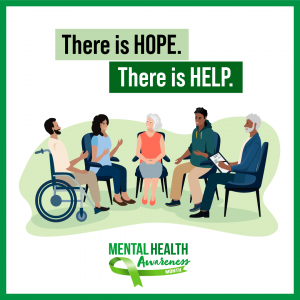
Did you know that your mental health is essential for your overall well being at every stage of your life? That being said it makes good sense then to invest time and energy to make your mental health a priority!
Since May is Mental Health Awareness Month it’s a perfect time to do a check in to see how well you are doing.
It’s likely you’ve been feeling a bit more stressed of late. You are not alone either. All one has to do is turn on the news or read an article or post on social media and bam we are hit with barrage of negativity.
Feels like the world is shouting at us from all directions. It’s noisy, loud and in our faces no matter where we look too. People are worked up, some scared and some angry. Even when driving we can encounter the intensity of those around us.
All this can lead to feeling more anxious, drained, perhaps a bit depressed too. We all are carrying a load these days. Sometimes we can’t really afford to power through it all.
Consequently we need to pause, recognize our emotional distress and find some tools to take good care of our emotional well-being.
It might seem kinda obvious, but really just how often do you ask yourself how you are feeling — and then pause to really consider your response?
Checking in on your mental health starts with assessing how you are feeling. Do you notice feeling stress, anxiety, worry, sadness, anger, irritability, depressed or other challenging emotions?
Use a scale of 1 to 10 to determine just how much of the emotional distress you carry with 1 being little and 10 being the highest. It can help to take note of how you feel at the same time each day.
Keep track in a notebook or journal, or simply keep a mental track of your numbers. If your number goes up, that’s a sign you need to pay attention to your mental health.
It’s also important to notice how you’re feeling physically, too. Some ways mental health concerns can show up physically include:
*Stress: Headaches, body pains, skin rashes, or worsening of chronic health problems
*Anxiety: Headaches, stomachaches, muscle tension, or frequent urination
*Depression: Appetite changes, weight loss or gain, loss of energy, and unexplained aches and pains
So, take note of any of these physical symptoms of stress too!
So, turn your phone off or put it on do not disturb for a set period of time that you determine is needed for your peace of mind. Give yourself permission to disconnect from calls, texts, emails, alerts, social media, Facebook and the news too.
This can help you to reclaim some calm and a sense of control.
After all, the world will be there when you get back to it! And that’s whether you like it or not too!
We can ease anxiety and distress by noticing and focusing on our breathing. By taking a few deep, intentional breaths we can shift our entire mindset.
One way of practice is to: 1) Breathe in slowly. 2) Hold breath. 3) Breathe out.
Notice the breath coming into your nose and filling up your chest as it expands. Notice what happens as you hold your breath and then what occurs as you exhale. Doing this for just 60 seconds can lower your stress level.
When you practice breath focus you remind your nervous system that you are safe and there is no need to be on red alert. And then your system calms down with you.
By taking a walk-in nature, a hike through the woods, a group fitness class, or going to the gym you can increase your energy levels, reduce depression, and boost your mental health well-being.
Dance around the house while you do chores. You will not only get your work done, but dancing reduces levels of cortisol, a stress hormone in your body and increases endorphin’s, that are your body’s “feel-good” chemicals.
Stretching, yoga, tai-chi can all help with managing stress, relaxation, getting better sleep and are a way to help improve our mental health.
What are you doing to bring yourself joy? Can’t think of anything? Might be time to change that.
With so much to do and so much going on it’s easy to push leisure to the bottom of the pile. Taking time and making opportunity to be happy is important to your mental health.
Here are a few ways to incorporate joy into your life:
*You can create a gratitude journal. Write down three things you are grateful for each day. Gratitude is a powerful way to shift your outlook. Seeing the glass half full is a wise perspective. Especially in the midst of challenges there are still things we can be thankful for.
*Do something new—plan a mini getaway, get creative with a new recipe, try painting a picture, do a new craft project, write a poem. Creative expression and positive well-being are linked and help relieve stress and anxiety too.
*Laugh—watch a funny movie or television show. Visit with loved ones who make you smile. Go hang out with a funny friend or check out funny videos online. Laughter helps reduce anxiety. Let laughter and smiles warm your heart.
*Spend time with a furry friend—your dog, cat, or another loving pet. Time with animals actually lowers the stress hormone – cortisol, and boosts oxytocin – which stimulates feelings of happiness. If you don’t have a pet you might hang out with a friend who does or volunteer at a shelter.
*Go sit outside in the sun for 15 minutes. Don’t forget the sunscreen. Sunlight synthesizes Vitamin D that experts believe is a mood elevator.
*Put a smile on your face. While it may not be easy to do, smiling does help to lower your heart rate and calms you down.
Having a strong support system is important for our mental health. Do you have someone(s) in your life who you consider trustworthy and loving and you can turn to when you need it most? If not perhaps it’s time to build up your support team.
Support team members can be a partner, sibling, healthcare provider, faith leader, friend or other trusted individual.
Do have at least one person in your life who you can trust to: give good advice when you need and ask for it, is respectful and trustworthy, gives you space to make your own decisions, grow, and even make mistakes too.
Also have someone(s) who actually listens to you and has your best interest at heart.
Support groups are a resource to find a group of people who can relate to your challenges and provide support. There are numerous kinds of support groups in every community too. Call 211 a help referral source here in Michigan to find a group near you.
Also, give yourself permission to reach out for professional counseling if your mental health is making it hard to function well with all the challenges you face.
Above all, remember that recognizing we need help and asking for it is indeed a strength!
Do Contact Me to begin therapy today! Don’t wait to take good care of yourself!
Anxiety Therapy, Depression Therapy, Grief Therapy, PTSD Treatment, Substance Abuse Treatment
JD’s Midlife Tools For Living Practices, Holland, MI
Offering Heartfelt care, Compassion and Coping Tool

Photo by MART PRODUCTION: Pexels
Mental exhaustion happens when your mind is tired, exhausted or fatigued. It’s a drain on your brain that happens when you are frequently on red alert or stressed out or you’ve been focused on a mentally tough task for some time.
All kinds of things can lead to mental exhaustion—your job, caring for family whether it be for kids or aging parents, coping with the stress of uncertain times for example.
*Anger or impatience—bad moods, short temper, irritation, snapping at people more often. In other words, mental exhaustion makes it hard to control our emotions.
*Decreased productivity—can’t get work done, hard to concentrate, motivation goes down, miss deadlines, easily distracted. Just doing small tasks can be overwhelming.
*Zoned out—mind wanders, drowsiness, difficult to pay attention, reaction time slows down. Car accidents are often linked with mental fatigue.
*Insomnia—hard time sleeping, tired during the day. Lack of sleep makes mental exhaustion worse.
*Increased alcohol or drug use—drinking or using more drugs to help manage stress and control impulsive behavior. For those who have a substance use disorder mental exhaustion takes a bigger toll.
*Depression—move in slow motions, little energy, feel numb or hopeless. Mental exhaustion can make it hard to finish work projects or do daily activities.
*Anxiety—worry, panic. Mental exhaustion triggers the sympathetic nervous system ‘flight’ or ‘fight’ alarm bells that say something is wrong.
*Physical activity decrease—exercise tolerance decreases. It takes more energy/effort to move than it once did.
*Eating habits change—may crave sugary, salty or fatty foods or may not be hungry at all.
*More mistakes—can’t easily catch and fix mistakes quickly or at all.
*More pain—experience more headaches, sore muscles, back pain, stomach problems. Ongoing health problems hurt more than usual.
Do you notice any of these symptoms in yourself? If so perhaps it is time to do something to help yourself! Don’t let the consequences of your mental exhaustion get worse.
Importantly, take short breaks when you are doing mental work. Take a break every hour or 2 for a few minutes.
Use the Pomodoro Technique: Set a timer for 25 minutes and focus on one task the entire time. When the timer goes off take a 5-minute break. After 4 sets take a 15-30-minute break. And repeat until your work task or workday is done.
Exercise during your breaks do jumping jacks or stretches or take a 10-minute brisk walk.
Certainly do find a way to relax and learn to switch on your natural relaxation response when you need it the most. For instance, activities like massage, meditation or yoga can help you learn how to calm your system down.
Get support from friends or family.
Most importantly reach out for professional help. Do so especially if your depression or anxiety is creating intense despair and hopelessness for you.
Unfortunately, we can’t avoid the stressors that life brings or the mental exhaustion that can accompany living life’s challenges. However, we can make self-care a priority. So just what will you do for you today?
Do Contact Me to begin anxiety therapy or depression therapy today! Don’t wait to take good care of yourself!
JD’s Midlife Tools For Living Practices, Holland, MI
Offering Heartfelt care, Compassion and Coping Tool
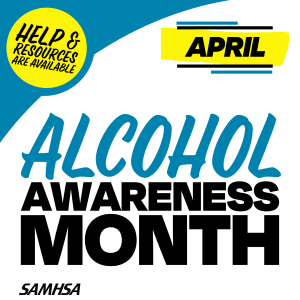
Alcohol awareness question 1: Do you know how an alcohol drink is measured as in I only had one or two? Alcohol awareness is important to have. Well, here in the United States, a “standard drink” is any beverage containing 0.6 fluid ounces or 14 grams of pure alcohol. So exactly what does that mean?
*12 ounces of regular beer, about 5% alcohol
*8-10 ounces of malt liquor or flavored malt beverages such as hard seltzer, about 7% alcohol
*5 ounces of table wine, 12% alcohol
*3-4 ounces of fortified wine, 17% alcohol
*2-3 ounces of cordial, liqueur, aperitif, 40% alcohol
*1.5 ounces of brandy or cognac, about 40% alcohol
*1.5 ounces or a shot of distilled spirits—gin, rum, tequila, vodka, whiskey, about 40% alcohol

Say beer…what equals 1 standard drink? 12 ounces. So, 16 ounces is 1 1/3 drinks, 22 ounces is 2 drinks and 40 ounces is 3 1/3 drinks.
With malt liquor 12 ounces is 1 ½ drinks, 16 ounces is 2 drinks, 22 ounces is 2 ½ drinks and 40 ounces is 3 1/3 drinks. Malt liquor has more alcohol content.
A regular size bottle of wine (750 ml) is 5 drinks!
With 80 proof distilled spirits—a shot is 1 drink. A mixed drink or cocktail has 1 or more drinks in it depending on the number of shots in it. A half pint is 4 ½ drinks and a pint or half bottle has 8 ½ drinks in it.
Guess how many drinks in a fifth…17 drinks!
Alcohol misuse includes binge drinking and heavy drinking. Misuse of alcohol increases your risk of experiences harmful consequences due to drinking. The more drinks you consume on any day and the more alcohol misuse over time and the greater the risk you have for developing problems.
When someone binge drinks they have a pattern of drinking alcohol that brings their blood alcohol concentration (BAC) to 0.08%. This typically happens when a woman has four or more drinks, or a man has five or more drinks, within about two hours.
Heavy drinking for women is consuming four or more drinks on any day or eight or more per week. And for men consuming five or more drinks on any day or 15 or more drinks in a week.
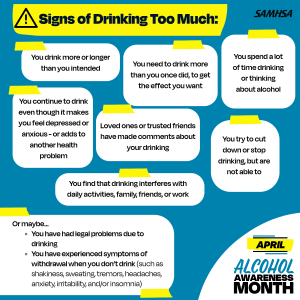
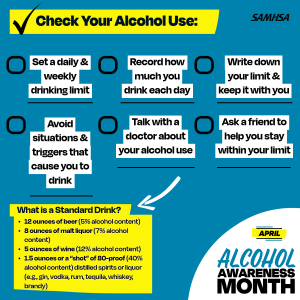
If you would like to learn more including how alcohol affects your health check out the Substance Abuse And Mental Health Services Administration website and explore this resource:
Now that you have increased your alcohol awareness, if you are concerned about your own or a loved one’s alcohol use know it is ok to reach out for substance abuse treatment. Do Contact Me today!
JD’s Midlife Tools For Living Practices, Holland, MI
Offering Heartfelt care, Compassion and Coping Tools

Image by erik-karits-2093459 on Freepik
Hey West Michigan the song birds are back! And, they are very happily singing away outside. Give yourself a mental health break and do go have a listen.
At one point on my walk I was surrounded by a variety of bird tunes. Literally it was like surround sound outside. The tune they all created just for me was beautiful.
I stopped walking and stood listening for a bit in awe and amazement. In addition I found myself smiling both inside and out. The chorus was just so delightful.
From such little bodies come such huge voices. They so freely give of their energy and spirit and bring such joy. They sound so happy too. It’s hard not to feel some of their excitement when you have a listen.
When was the last time you stopped and delibertly gave yourself a time out opportunity to improve your mental health? Research has shown being out in nature and hearing birds sing is beneficial for our mental health.
For more information about the benefits of listening to bird songs check out my blog post:
Looking for a way to improve your mental health?
Go give yourself a little mental health break. You might go for a walk, stand in your back yard, take a drive to find a wooded area and open your car window, head to a park to take a hike, have a sit on your front porch.
Most importantly open your ears, close your eyes and have a listen. Be present and savor the gift the song birds are creating just for you!
It is clear to me those little feathery friends of ours are glad to be back. Their joyful tunes tell me so. I for one am most happy to hear them singing once again.
I notice the tunes more keenly this time of year. So many of them are gone for the winter. It’s very apparent song birds are back. And I am grateful for the joy they bring to my heart!
So you can give them a chance to bring a smile to your face and in your heart too! All you gotta do is take a little mental health break and head outside. I wonder who is singing and what song they are creating now?
If you are looking for other ways to give yourself a mental health break especially if you are dealing with depression or anxiety or grief, Do Contact Me today to begin therapy and learn some additional life coping tools!
JD’s Midlife Tools For Living Practices, Holland, MI
Offering Heartfelt care, Compassion and Coping Tool

March 7, 2023
I have a few crocuses planted in our front yard. Each year I look eagerly to see if, just if they have come up yet. They are a sign of spring hope. After the long often gloomy winters we have here in West Michigan they are eagerly awaited.
In 2023 on the 7th of March I was thrilled to see a tiny little purple ray of spring hope shining in my yard! She had popped out of the ground and made her debut. She was the only one who had been brave enough to poke her nose up out of the ground and bloom so early that year.
She was snowed upon more than once, iced upon and kept on coming back for more bloom time in March of 2023. She was not about to give up!
This year she has a partner who popped out to join her for their first spring appearance on March 12th. The snow had been piled high on top of them and just melted away a day or so before they bloomed.
Somedays when things have grown tough, I need a little reminder of the courage and strength of others who endure and keep on going and don’t give up.
It’s easy to get discouraged and even lose hope when things aren’t working out as fast or in the way as we hoped or want it to be. However, it’s important to learn how to ride the waves, turn the corners, hike up the mountain a bit further, and keep blooming in the face of adversity.
Fortunately, we don’t have to look very hard to find some spring hope whether it be a situation Mother Nature provides or a person we know of who like the ‘Energizer Bunny’ keeps on keeping on no matter what.
We can with intention openly take notice of the courage and strength on display in the world around us and allow this inspirational energy to flow into our hearts!
Take a long look at the people in your circle of the world. Notice who has weathered through hardships and the qualities they possess that helped them do so. Let them bring some spring hope into your heart.
Look at the worlds of Mother Nature around you. Notice the amazing feats of the animal, plant, insect, geographical worlds in your neighborhood. Soak it all in and let Mother Nature inspire your heart.
Do reach out for professional help. Sometimes therapy is what helps us find hope when life feels utterly dark and dreary.
Through Grief Therapy, Anxiety Therapy, Depression Therapy, PTSD Treatment or Substance Abuse Treatment spring hope is possible to find.
Do Contact Me Today!
JD’s Midlife Tools For Living Practices, Holland, MI
Offering Heartfelt care, Compassion and Coping Tools
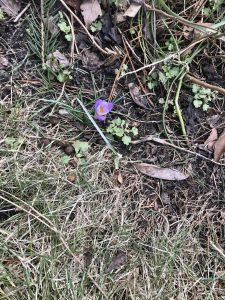
March 11, 2023

March 14, 2023

March 25, 2023

March 12, 2025

Image by stockking on Freepik
If you binge on news or social media in search of the scoop about the latest political pronouncement, tragedy, crisis, or disaster you just might be a doomscroller.
Doomscrolling typically starts because we want to know about a situation to understand what’s happening and maybe prepare our self for it. But gradually a doomscroller becomes absorbed in the news content. Their thoughts become preoccupied with the news. Then in an attempt to reduce the anxiety that builds up, they end up consuming even more news! It’s a vicious cycle.
Research shows the more a person doomscrolls the more physical and mental health problems they report experiencing. A 2023 study reported that doomscrolling led to worse mental health and a decrease in overall satisfaction with life. It also interfered with daily living.
People who reported a higher level of problematic news consumption had a much higher level of mental and physical health problems than those who did not report experiencing the behavior.
Some of the physical effects of doomscrolling include nausea, headaches, muscle tension, neck and shoulder pain, low appetite, difficulty sleeping, and elevated blood pressure.
Doomscrolling can even give us what’s called “popcorn brain”. When we spend too much time on line we can actually feel our brain popping due to overstimulation. This phenomenon can make it harder for us to engage with the real world that moves at a much slower pace.
There is an old saying ‘if it bleeds, it leads’. And the media is all about drawing an audience, a numbers game, ratings, selling ads. Sensational headlines and stories draw us in.
Social media platforms learn from our behavior. So, when we consume negative content, they deliver more and more of it, creating an endless loop.
Doomscrolling reinforces negative thoughts and feelings. It can worsen any pre-existing depression or anxiety we might have. It can make us irritable, fatigued, and less productive too.
You feel ok when you first grab your phone but after a few minutes do you notice feeling:
– more anxious?
– angry?
– disheartened?
– disgusted?
– helpless?
Do you put off going to sleep so you can doomscroll, stay up later than your bedtime and lose sleep? And then perhaps be a tad grumpy or impatient the next day?
Have you noticed that you spend more time with your phone than with other people?
Are you moving and exercising much less than you used to? And sitting way more than is heathy to do?
Perhaps it’s time to do a little something different if you see yourself in what you’ve read so far!
The key is to decrease your dependence on social media and the news. It’s important to establish some ‘digital boundaries’ to help your body and brain get itself back to functioning normal.
At night, keep your phone off your nightstand. It can be in the bedroom just out of your easy reach.
Do something similar with your phone at work. Put your phone in a desk drawer or put it 10 feet away from you while you are working.
Put your focus on community news as it tends to be less doom and gloom focused.
Say no. Be in control. Let people who are sharing depressing or violent stories know that you’re not interested.
Focus on good. Perhaps volunteer at a charity or take part in emotionally freeing activities, walks in nature with others or take a dance class.
Do check out this blog post: Anxiety Therapy Tips For Taking in Bad News
for some additional tips.
Reach out for help if you can’t stop or limit your doomscrolling or if you are extremely upset or anxious. Sometimes we need a little extra professional help to make the changes we need to make in our lives.
Remember: if nothing changes, nothing changes!
Contact Me today if you would like to begin Anxiety Therapy!
JD’s Midlife Tools For Living Practices, Holland, MI Offering Heartfelt care, Compassion and Coping Tools!

A mindful judgement example: Have you noticed the cost of groceries these days? I was shocked recently with some of the prices on the shelves here in Holland, MI. And found myself worried about how young families and people on limited incomes are faring. I even started fretting about how we will make it in the future if prices keep soaring. I was predicting gloom and doom, felt anxious and unhappy.
Many times, in my judgements I am in conflict with what actually is happening. And as a result, I have an emotional reaction to what is unfolding in front of me.
Lots of times I really don’t want what is to be the way it is. I want it, things, life to be my way. My fight with what is, just as it is, causes me distress and turmoil, leaving me feeling anxious and depressed.
One practice of mindfulness is to simply pay attention to the content of our thoughts by intentionally noticing and labeling our thoughts for what they are.
When you recognize a judgement in your thinking process, gently observe in your mind that you are judging, say to yourself “judgement thought.” In doing this we actually get a little space between us and the actual thought itself. This space allows us to take a breath and decide what to do with it, even perhaps let it, the judgment go.
Isn’t it just a thought, not a fact, not something real or tangible, it’s just a thought, and a judgment thought too!
If we don’t see our thoughts for being just thoughts, they can take on a life of their own and become real. And we react emotionally to a judgement perception of reality that we have determined to be a true fact.
We have zillions of thoughts every day. Our thoughts can have power over us if we are not mindful or aware of them, recognize how they impact our lives and affect our relationships too.
Once I’ve realized I’ve made a judgement in my thinking I then can decide what to do with that mindful judgement thought. I can hang on to the judgement and go with it further in my thinking and react with the judgement in my mind. Or I can be curious about that judgement itself, explore where it comes from and just how valid it is. And decide whether to keep it, change what needs changing so I can live with more peace inside.
My grocery price example: I have a choice to make–accept that grocery prices go up and I really can’t change that and adjust my budget and menu to accommodate that fact. Or quit eating and starve. Or be frustrated and worried every time I go to the store predicting a future filled with doom and gloom.
The decision: Life it too short not to have peace in my mind as well as my favorite foods on the table to enjoy. I’ll adjust my menu a bit, set aside more food money in my budget and cut back on somethings I really can live without.
What judging thoughts do you notice occurring in your mind right now?
Do Contact Me if you notice that your judgement thoughts are creating too much distress and turmoil in your life! With anxiety therapy, depression therapy mindfulness tools can help make a difference.
JD’s Midlife Tools For Living Practices, Holland, MI Offering Heartfelt care, Compassion and Coping Tools!

In this happy heart month of February not everyone has a happy heart to share with others. This is a challenging time for many of us for all kinds of reasons. It is an opportune time for some good care taking.
Care taking and bearing witness to suffering of any kind is in itself very painful. I am reminded of that from the blog post 7/17/14, “Let me kiss it and make it all better” which still rings true for me today.
Back then I wrote: “It is painful to watch someone we love struggle through a hard time—it just is. We want to soothe away their distress and calm their fear and worries, but we can’t kiss it and make it all better.”
But as I wrote in 2014: “We can offer support, reassurance and love but we don’t have the power to make the wound go away. And even if we did, the life lessons to be gained from the challenges they face would be lost.”
Actually, we would be doing our loved one more harm than good if we cleared their slate and wiped it all away.
I’ve found it to be true for me in my life. As I noted in 2014: “I know I’ve learned so much from working through the really hard realities of my own inner turmoil”. I do know I would not be who I am today if I had not done all the hard work to be here, to have learned all it’s taken to get here.
“To give that struggle to those we love by simply hearing of it however, takes courage. It is painful to stand alongside someone and simply offer support and comfort.”
Yet that is what we all need on our life journey. The support and comfort we receive from another human being brings us connection. It is the connection that we need. We are not so alone. We learn we are not the only one. This is care taking at its finest.
When we muster the courage to share that inner most pain with someone we trust we begin to heal the wound. We do the work. And we learn and grow. Our resilience and strength grow too.
Care taking of ourselves is hard work. Facing pain from wounds takes courage. We might want to avoid the pain, wish it away, drink ourselves numb to it, or try to stuff it deep down inside. But until we take care of ourselves and face it and work through it, the wound in our heart remains wide open.
Validating our own experience can be a place to start. Writing in a journal or writing a letter to yourself can help you give words to legitimize the pain in your heart and start to face the wounds you carry.
Finding a trusted person to connect with and share of your pain can help your healing journey. Someone you can be open and honest with, who will accept you and validate your feelings and experiences. Someone who will offer support, reassurance and care.
Sometimes in care taking of ourselves it can be useful to give ourselves the opportunity to engage in professional therapy/counseling. This is especially important if we experience symptoms that truly interfere in our daily functioning.
Do remember that you can indeed do whatever it takes to help your wounded heart heal! And importantly, you deserve to do good care taking of you too!
In your care taking Do Contact Me to begin Depression Therapy, Anxiety Therapy, PTSD Treatment, Substance Abuse Treatment, Grief Therapy to help your wounded heart heal!
JD’s Midlife Tools For Living Practices, Holland, MI Offering Heartfelt care, Compassion and Coping Tools!

Photo by Steve Johnson: Pexels
Back on 12/31/2017 I published a blog post titled ‘Imagine’ that seems unfortunately to sum up my current state of being:
“I feel rather demoralized when I turn on the news and watch the systematic decline of the nation’s progress towards equality, inclusion and respect for human decency unfolding in front of my eyes.
It’s been an ugly time that I’ve been at odds with and fought fiercely against in my mind. And, just when I thought that perhaps, just perhaps some progress was being made towards a healthier future for us all, the rug was yanked out from underneath me. I didn’t see it coming. I’ve lost my balance. I’ve felt genuinely lost too.
I keep wondering how we’ve come to be in this place at this point in time having not learned from past historical mistakes that we appear to be repeating.
Maybe it’s a fear of change, of lost position, power and privilege for some and a fear of scarcity this change could bring that fuels a drive to hold on to a past way of life and thinking that is old, self-serving and out dated.
This is a sad reality to me. Beneath my outrage a deep sadness flows. I’d thought better of us as a nation.
It is our need for love and the connections we make with others that allows us to best cope with the vulnerability our very human experience brings for each one of us. We really don’t do so well when we try to go it alone in life whether as an individual or as a nation. People can end up bullying others to pump up their very fragile shame filled ego. We see this being played out on our national stage.”
As that year 2017 wound down the “Me Too” movement began to gain momentum and true leaders in our country were speaking out for climate change action promising to honor the Paris Accord regardless of what our elected officials wanted. It felt like there was some hope for forward movement rather than backward decline.
I can’t. And here I am once again sitting stunned, absolutely stunned, too shocked and dumbfounded to even get all worked up in outrage. Yet, that is. I suspect outrage is coming my way before too long.
I just never imagined I’d be here again grieving a huge loss sitting in the shock part of the grief process. It’s the loss of that hope we as a nation were going to learn and do better. A hope instilled in me from my childhood, as I wrote in 2017:
“I grew up with the lyrics of Beatle, John Lennon’s song “Imagine” in my mind and obviously in my heart too. It must have influenced me more that I realize.
“…imagine all the people living for today, imagine there’s no countries, it isn’t hard to do, nothing to kill or die for, and no religion too, imagine all the people living life in peace…no need for greed or hunger, a brotherhood of man, imagine all the people sharing all the world…you may say that I’m a dreamer, but I’m not the only one…”
I’d like to think the Mr. Lennon and I are not the only ones. I’d like to think that us dreamers who imagine living in a peaceful world will rally together. And we build a strong collective voice to challenge and find a path to unify this fragmented, deeply divided and disenchanted nation of ours. Future generations need us to. I fear for them if we don’t.
It’s very important to pull out all those good coping tools that we have and put them in high gear use. I’m writing this for my benefit too not just yours! Practice what I preach time.
Tools like: get good sleep, eat healthy foods, move your body—go for a walk and stretch your body, limit news consumption, write in a journal, set aside time to meditate, be mindfully present taking one day at a time, connect with friends and family. Just to name a few.
Remember that this is a very stressful time so be kind with yourself. You are not the only one struggling with this nation’s current state.
I stumbled on a wonderful website that offers words of wisdom and specific coping strategies for women who are really struggling with trauma like reactions to our current political climate.
https://wisdom.aspaceforwisewomen.com/the-power-of-wise-peaceful-warriors/
I do encourage you to take the time to explore the wisdom Sarah Coffman offers.
If you should find yourself struggling with much too much worry or very dark depressed moods or intense trauma reactions do reach out and begin therapy to help yourself.
We gotta have hope. As Mr. Lennon said …”hope someday you’ll join us, and the world will live as one!”
I love the concept of a ‘wise peaceful warrior”, that Sara Coffman suggests. And I agree with her that we can’t be a ‘wise peaceful warrior’ if we do not have peace within ourselves. It’s imperative for each of us to know peace inside. Without it we won’t successfully unite our world, our nation, our communities.
If, just if, we do join together as wise peaceful warriors and even more of us this time unite to pursue peace…just imagine what a wonderful world it would be!
Do contact me to get started with depression therapy, anxiety therapy or PTDS/trauma treatment today!
JD’s Midlife Tools For Living Practices, Holland, MI Offering Heartfelt care, Compassion and Coping Tools!

Designed by Freepic
The holiday season is supposed to be a fun time of year full of parties, family gatherings and celebrations. But instead it can be a time when you are sad, lonely, depressed and anxious.
This time of year, can be a painful reminder of loved ones we’ve lost or are separated from. And, if we lack close relationships it can be difficult when we see others gathering with friends and families. When we compare our holiday experience with a picture-perfect view presented on social media we can end up feeling very disappointed.
When we do gather with family, complex dynamics between family members can be a source of tension and stress—even anticipating them can wretch up our anxiety level. And then all the added expenses, pressures and activity of buying gifts, traveling and hosting can lead to increased stress and anxiety.
As a result, it can be hard to find joy in the midst of it all.
If the holiday season gets you too down, depressed and anxious, it’s ok to ask for some help! And you don’t have to face all this alone.
Do contact me to get started with depression therapy and/or anxiety therapy today!
JD’s Midlife Tools For Living Practices, Holland, MI Offering Heartfelt care, Compassion and Coping Tools!

Photo by Nicole Michalou Pixels
Did you know that high intensity drinking is a high-level form of binge drinking? To binge drink means a woman consumes 4 or more drinks in a single drinking episode and a man consume 5 or more. A high intensity drinker doubles that amount. So, 8 or more standard drinks consumed for women and 10 or more for men in one drinking episode.
High intensity drinking is drinking a lot of alcohol in a short span of time and is extremely dangerous.
According to The National institute on Alcohol Abuse and Alcoholism, “In the United States, one “standard” drink (or one alcoholic drink equivalent) contains roughly 14 grams of pure alcohol, which is found in: 12 ounces of regular beer, which is usually about 5% alcohol. 5 ounces of wine, which is typically about 12% alcohol. 1.5 ounces of distilled spirits, which is about 40% alcohol.”
First off, our bodies can only process about one drink of alcohol an hour. Even this varies depending on your weight, your age, and even your sex.
Women typically have higher blood alcohol concentrations than men after drinking the same amount of alcohol. That is because women have proportionally more body fat and less water than do men even when they weight the same. Since alcohol is dispersed in body water, women’s bodies take longer to process alcohol than men ‘s bodies do.
When we consume a lot of alcohol in a short time, the amount in our bloodstream can stop our body from working properly. People who do high-intensity drinking are more likely to drive while drunk, be injured while drunk, have physical fights, get arrested, end up in the emergency department, take part in risky sexual behavior, vomit, pass out, black out—not remember what happened and get alcohol poisoning.
Alcohol poisoning happens when levels of alcohol in the bloodstream harm our internal organs and can affect our breathing and heart rate. About 2200 people die in the US each year from alcohol poisoning.
A new study from the University of Southern California revealed that levels of heavy drinking rose significantly, 20 percent during the pandemic and have stayed elevated in the post-pandemic years.
Young people and men have historically been associated with heavy drinking. But new research notes a sharp rise in heavy drinking among adults in their 40s.
The reasons someone might drink excessive alcohol range from having a genetic disposition to self-medicating.
For young people high-intensity drinking is motivated by the expectation that it would make them more social and help them have fun with friends.
It turns out in part this is now true for middle aged people too! A recent National survey shows that middle-aged and older adults also drink excessively during social events. In addition, they also reported using drinking as a way to deal with stress.
Many studies find that people intensify their drinking to celebrate special occasions and bond with friends and family during holidays. Also, high intensity drinking is more common around special occasions and holidays including New Year’s Eve.
According to The Centers for Disease Control and estimated 178,000 people die from excessive alcohol use each year in the United States. Men are the most likely to die from alcohol-related causes, but women have become 2.5 times more likely to do so! The Midwest has had the steepest rise of alcohol related deaths.
Take a moment and think about what is most important to you this holiday season. Do you want solid memories of an enjoyable holiday with family and friends? Or are you willing to risk drinking so much alcohol that you can’t remember what happened? Perhaps cause a drunk driving accident and end up in jail? Or puke all over your friends living room floor and need to be carried to the car and driven home?
When you drink at high intensity levels the risks are high.
Some of the health risks of consuming too much alcohol includes brain damage. Alcohol interferes with our brain’s communication pathways that affect our moods, behavior and coordination.
When we drink too much our heart can be damaged causing cardiomyopathy, arrhythmias, high blood pressure and strokes. Heavy drinking can lead to liver disease, including cirrhosis, alcoholic hepatitis and liver fibrosis.
Heavy drinking increases our risk for various cancers including mouth, throat, esophagus, liver, breast and colorectal. Alcohol can cause inflammation of our pancreas.
Drinking too much can weaken our heart muscles and damage our nervous system too.
To not do high intensity drinking you can:
-Set a limit on the number of drinks you will consume. And stick to it!
-Drink another beverage like water after you consume an alcohol beverage.
-Take sips of your drink and be mindful of its’ taste.
-Eat before you start drinking.
-Practice saying ‘no thank you’ to offers for another drink.
-Find healthy ways to deal with your social anxiety—for example slow steady breathing (inhale for 4 counts, hold for 2 counts, exhale for 6 counts) to calm your system down.
For other ideas you can check out a list of ‘50 Tips To Stay Clean And Sober This Holiday Season’ that I put together many years ago. You will find it on my Coping Tools Page under the Addiction topic.
https://www.midlifetoolsforliving.com/coping-tools/
Reach out for substance abuse treatment if you find yourself unable limit your drinking and the consequences are beginning to concern you and your loved ones too.
Do Contact Me Today to begin your high intensity drinking healing journey!
JD’s Midlife Tools For Living Practices, Holland, MI
Offering Heartfelt care, Compassion and Coping Tools

Designed by Freepik
Do you know that 59% of us are worried about having political disagreements and tension at our Thanksgiving tables? And 23% of people surveyed are considering not celebrating Thanksgiving with their families all together, according to a survey by Spruce.
Holiday election anxiety stress is real and affecting us big time as we move into the season.
The question is just how much power will we give it? Will we really allow politics to interfere with our family relationships and celebrations and other aspects of our lives that are important to us?
I read an article about a woman who is so angry with her husband and his family about the choices they made at the election polls that she canceled both Thanksgiving and Christmas celebrations for herself with them.
This woman has handed so much power over to politics. Politics has taken a front seat in her life and the people who were once important to her have been pushed aside because they have a different political view than hers. She can’t tolerate those differences. Her election anxiety stress has changed her holiday.
This amount of anger will destroy one’s life. It will eat away at us, keep us awake at night. It will affect our outlook on life, our ability to be healthy both physically and mentally. This anger will keep us reacting, blowing up, raging at the world around us. It will drive people away from us.
The divide in our country is being carried on by both sides reacting to one another. Each shouting their side is right and the other side is wrong. Emotions are heightened on all fronts. These emotions are driving us further apart.
When we have great big emotions, they take over our mind. When emotions run so high we are not able to access the logical part of our brain that helps us make wise decisions and responses in tense situations. We can end up blowing up, doing and saying things we later regret or that cause harm difficult to repair.
When emotions are ramped so high the only way we can respond wisely is to calm our emotional mind down. We can learn and practice tools to help us regulate our emotions.
First, we have to be willing to recognize if due to our election anxiety stress we are causing ourselves and others harm. That is not easy to do if we are set on the idea that the other side is wrong and we are right. No one wins this way. We all suffer.
Just cuz we are family doesn’t mean we are going to or have to agree on everything, including politics. Sometimes we can openly agree to disagree. And even come to accept that we do. Sometimes a family member insists that you agree with them and you don’t. You can come to accept that is how it is with this person and let that be as it is too.
The reality is that we each would not be who and where we are in life if anyone was different than they are in our families. Our lives unfold and have been influenced by those family members of ours in all kinds of ways. I would not be me without having had each of my family members in my life. The same goes for you.
We can decide to be grateful for the people we call family. And seek to understand rather than judge other people’s life choices, values, experiences, even political opinions. We can choose to love them no matter how different we are and think. We can respect our differences, look for what we share in common and lower our election anxiety stress.
*Take a break if your emotions and anxiety stress becomes ramped up. Go for a walk outside, head to the bathroom and take a few deep breaths, glance out a window and notice what you see.
*We don’t need to make our opinions known. Even if someone is professing there’s it doesn’t mean I need to state mine. Keep yours to yourself, especially if you suspect someone is poking or needling you.
*Don’t let anyone get under your skin. Deflate your emotional reactions—take a breath and linger on the exhale, put a smile on your face, grab a chunk of ice and hold it in your hands.
*Plan ahead and have ideas of conversation topics you can bring to the table—ask questions about your family’s past, remember a fun time you all had together. Interject a topic when you need the subject to change. Take control of the conversation direction.
*If you are involved in a political conversation with someone whose views differ approach the interaction with curiosity, seek to listen and really hear what the other person is saying. Avoid passing judgments. Look for common ground you share.
Hate has no place to sit at the holiday table…only if we bring it with us in our hearts. Family connectedness is important for us all and peace is a corner stone of holiday celebrations. Decide to carry peace in your heart this holiday season.
Treating others with respect and kindness is important no matter what beliefs we each have. Our country has so much mending to do if we are ever to be more unified and actually civil again.
The holidays are actually a perfect time to practice using coping tools for your election anxiety stress. And a perfect time to mend the divide that exists due political difference within your family system.
We have to start somewhere. This season is a great time to begin. We can celebrate with joy that we have the right to be who we are, think as we do and love those who love us too.
So, gather up your courage and strength. Face the election anxiety stress you carry. Write it out in a journal, walk it out as you rant and spew, talk it out with a like-minded friend, cry it out as tears release stress chemicals that build up in our systems. Defuse it so it does not have control over you. Rather you take control over it.
Stay in this moment. Stop yourself from projecting into the future. No one has a crystal ball. When we project a future moment in our brain we only add to the stress we carry. And truth be told we are doing this to ourselves. We do not know what the next moment will bring. We just don’t. There is no way that we can. There are endless variables that contribute to each moment life brings.
Find tools to navigate your way through any challenging moments this holiday season and practice using them. Let the peace in your heart guide you as you give family relationships the importance they deserve. Celebrate your family this holiday season. Refuse to let the election and your election anxiety stress tear it apart!
We do each matter, we each make a difference in the world around us. How I act and behave, what I say and do affects others. As the old Golden Rule saying goes—treat others as you would like to be treated!
I found a special recipe years ago that hangs in my kitchen as a reminder:
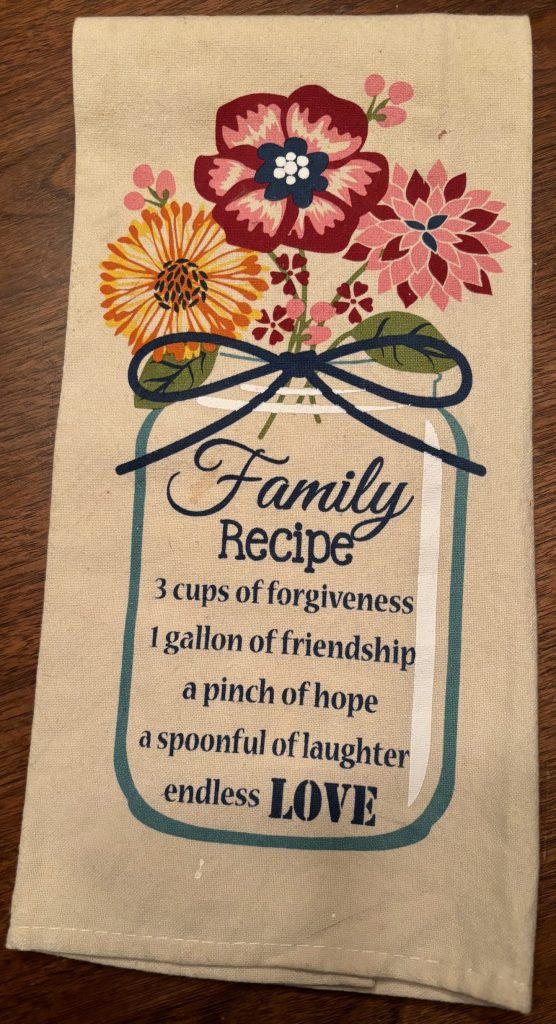
The 2 key ingredients in this recipe for me are love and forgiveness. Family relationships are complex, as imperfect as we all are and clearly important. We would not be filled with upset, anger, anxiety including election anxiety stress if we did not care about the people we call family.
Remember to have compassion for yourself too. The holiday season is a challenging time all by itself and even more so with election anxiety stress added to it. Take good care of you. Plan for some self-care time and activities to help you de-stress and de-compress. Celebrate the hard work that you are doing!
Do Contact me if you need some additional support during this holiday season. Anxiety Therapy can make a difference.
JD’s Midlife Tools For Living Practices, Holland, MI
Offering Heartfelt care, Compassion and Coping Tools
